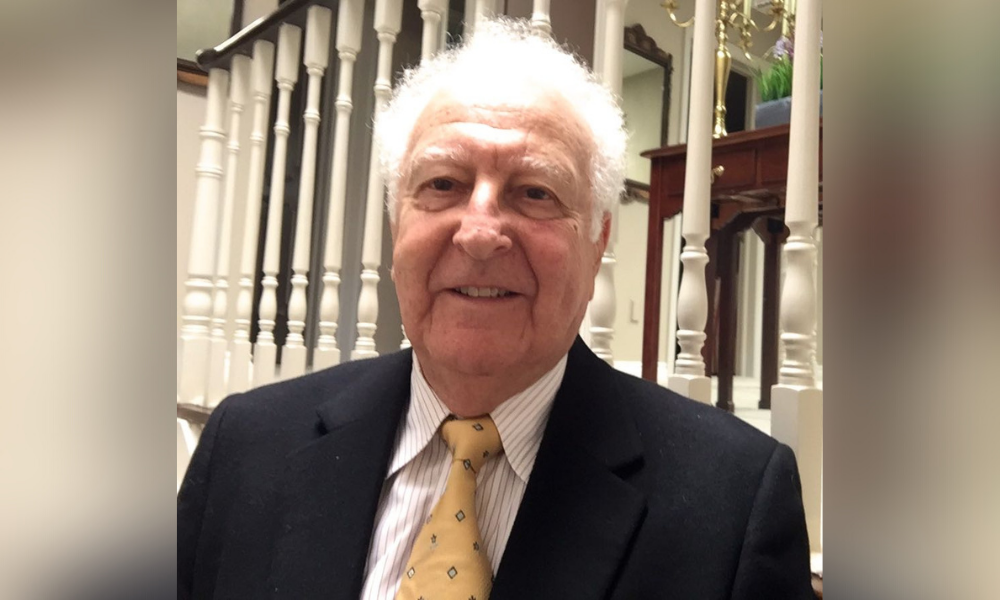
Bankruptcy and insolvency lawyer recommends tech training, tariffs and limiting number of lawyers

The Law Society of Ontario awarded an honorary Doctor of Laws degree to preeminent expert in creditor-debtor bankruptcy and insolvency law Franklyn Harris Bennett on Friday, October 1 Convocation meeting.
In his keynote speech, Bennett said the legal profession must take an immediate sharp turn to keep up with growing technology and presented three areas of discussion that will help the legal profession move forward in adapting to the dynamic changes in law in a rapidly evolving digital world.
“It is time to restrict the number of lawyers who can practise in Ontario,” said Bennett. He said many individuals, especially women who want to be lawyers, are leaving the private practice.
“In 1970, there were few lawyers in government, today every ministry and department have an army of lawyers. In 1970, few corporations had in house counsel, today numerous corporations have large legal departments. Why are they leaving? Because they can’t make a decent living.”
He said that increasing legal and computer training before granting lawyers their licenses is crucial.
Computer literacy of lawyers is now an asset for law firms and their clients, he said. “Lawyers could be anywhere including attendances at court hearings by video conferencing.”
With more claims against lawyers, Bennett said the LSO should restrict lawyers’ practice to protect the public. It is time for recent calls to the bar to take mandatory apprenticeships with established law firms before allowing them to practice alone to prevent an increase in law premiums.
“Many lawyers claim on their website to be experts or are specialists in many unrelated areas of law, when in fact, they have very limited experience in that area,” Bennett said.
“To prevent law society hearings over whether lawyers are capable and competent, lawyers should be better trained and supervised before setting up their own practice.”
Bennett’s last call to action was for the legal profession to impose tariffs on basic legal services like litigation.
He said access to justice has been generally illusory, and the main reason is cost. Despite contingency fees, class actions, pro bono cases, legal aid and justice net, Bennett said access to justice continues to be a significant issue because people who require legal services cannot afford lawyers.
“Lawyers’ fees have escalated to the point where any one of you cannot afford your hourly rate,” he said in his address to convocation. “Only the rich government or government-subsidized entities can afford to litigate today.”
He said predecessors of the legal profession initially thought that by the increase in the number of lawyers, hourly rates would fall, but this prediction has not been the case.
“Some lawyers charge well over $1,000 an hour. Competition in the marketplace has not lowered the hourly rates.” As a result, many self-represented persons clog the courts.
Lastly, he proposed that the LSO should consider recommending earlier mediation of disputes.
Bennett said his 50 years of practicing law had been adventurous.
“What I love about the law is that it is a continuing living entity, the law is not static, although state at times, the law is ever evolving and dynamic.”
According to the LSO website, Bennett was called to the bar in 1970 and is the principal of Bennett & Company in Toronto. He is the past head of section and lecturer for the Ontario Bar Admission Course on Creditors’ and Debtors’ Rights and Remedies, special lecturer in the Real Estate and Family Law sections of the Bar Admission Course, past chair of the bankruptcy and insolvency section of the Canadian Bar Association, National and Ontario, council member of the Ontario Bar Association, a former member of Advisory Committee to Industry Canada, a lecturer, and recognized author of many articles on bankruptcy and insolvency law cited across Canada.
Bennett said it is crucial for lawyers to love the law because they are responsible for improving the profession, protecting the public, and guarding the rule of law. He said an impactful change to the law often results from attempting to “fit in pieces where they did not fit.”
“The law is like the universe giant jigsaw puzzle with no visible boundaries, the picture keeps growing and growing.”
Bennett was awarded the Law Society Medal in 1995, OBA Excellence in Leadership Recognition Award in 2000, OBA Distinguished Service Award in 2005 and the CBA Recognition & Excellency in Insolvency & Restructuring in 2010.